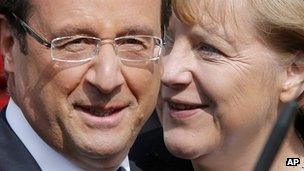BAE-EADS merger plans prompt three-way political talks
- Published

The French and German leaders are seeking a common position on the defence deal
Defence ministers from the UK, Germany, and France are expected to discuss later this week the planned merger of BAE Systems and EADS.
It comes after Prime Minister David Cameron spoke to the French president on Monday and with the German chancellor over the weekend.
The governments must give their blessing to the defence merger.
Mr Cameron's official spokesman said the UK would work to ensure the "public interest is property protected".
According to the AFP news agency, following Mr Cameron's telephone conversation with Francois Hollande and Angela Merkel, an informal meeting of defence ministers and officials is scheduled to be held in Cyprus on Wednesday or Thursday.
The companies hope to have government backing by 10 October.
The proposed merger of BAE and EADS, controlled by the French and German governments, has raised concerns in the UK that a key strategic company could come under foreign control.
There have also been concerns that BAE's considerable contracts supplying the US defence sector could be threatened.
The prime minister's spokesman said: "Given the nature of the companies' activities, the government will clearly have some involvement and we need to ensure that the UK's public interest is properly protected.
"We are working with the companies to ensure that that is the case. We are also talking to people in other countries about this.
"The prime minister spoke to Chancellor Merkel on Friday night and has spoken to President Hollande this morning.
"Clearly, the companies have activities in all three countries and you would expect us to stay in close contact on it. We have an interest in ensuring that the UK's interests are properly protected and we will do that."
The French and German governments were "speaking with each other and also with the companies" according to Chancellor Merkel's spokesman, Steffen Seibert.
"The topic... is so sensitive that one should not discuss in public the details of what is being considered," he said.
"There is a joint consideration of this question and this is happening in an intensive fashion."
No guarantees
The two leaders are seeking to hammer out a common position on the planned £28bn ($45bn) merger between defence firm BAE and defence and aerospace group EADS, according to the news agency Reuters, which had obtained a discussion paper from the German economy ministry.
The future of EADS, which owns the European aircraft manufacturer Airbus, is highly sensitive in France and Germany, because it is a major defence contractor and a major employer in both countries.
EADS would comprise 60% of the planned new company, which would have £60bn in sales and 220,000 employees worldwide, including 50,000 in the UK.
The paper noted that the deal on the table provided no guarantees that the merged company could not itself be subject to a takeover in the future.
It noted that the French and German governments would have no right to consultation about future operating decisions, such as whether to relocate production to another country.
It also suggested that EADS' share of the new company should be closer to 70%.
National security
The UK government holds a golden share in BAE Systems, granting it the right to block any deal, although it is thought to favour the merger.
According to a Downing Street spokesman, Mr Cameron spoke to President Hollande on Monday morning, having previously spoken to Chancellor Merkel on Friday night.
BAE Systems is intimately involved in UK defence procurement and national security, prompting the parliamentary defence committee to launch a new inquiry into the deal on Monday.
Both companies are big employers in the UK, including BAE shipyards in Scotland and EADS' Airbus wing factory in North Wales.
Another major concern for the UK is BAE's relationship with the Pentagon. The US government is one of its biggest customers, and has allowed BAE to work on classified defence contracts such as the new F-35 Joint Strike Fighter.
The Downing Street spokesman said Mr Cameron had not yet discussed the matter with President Obama.
Various rumours circulated over the weekend about how the deal might be structured to take account of national security concerns, including the suggestion that the US business might be ringfenced off.
There had also been speculation that the 10 October stock exchange deadline would be delayed to provide more time for the talks, but this was quashed by EADS on Monday.
"It is our intention and current expectation that we will be able to provide further clarity by 10 October," said a company spokesman.
- Published19 September 2012
- Published17 September 2012
- Published13 September 2012